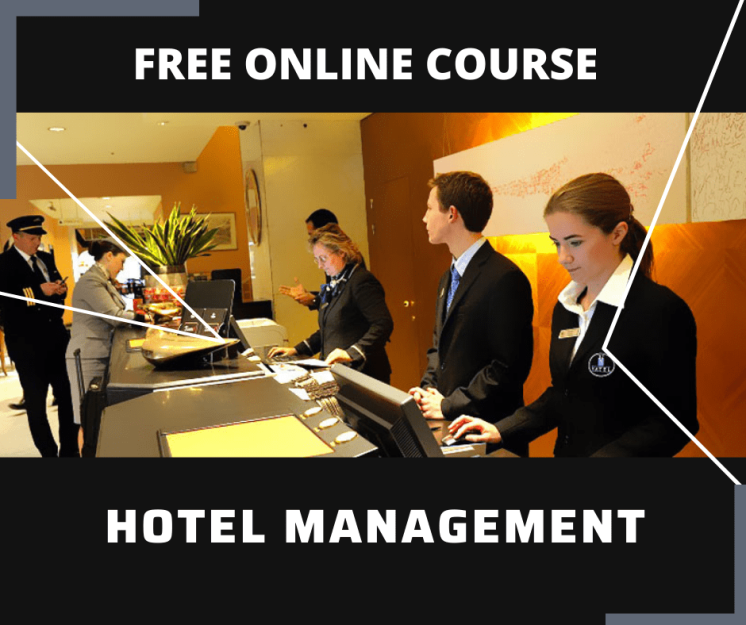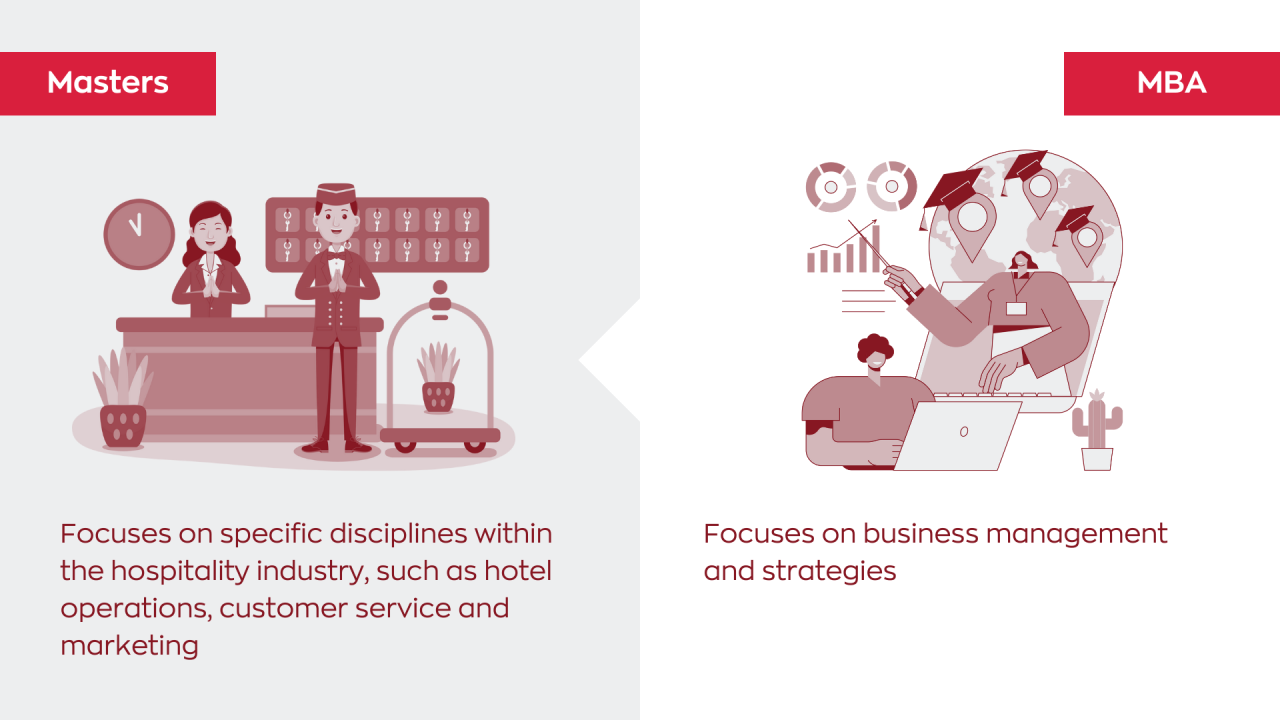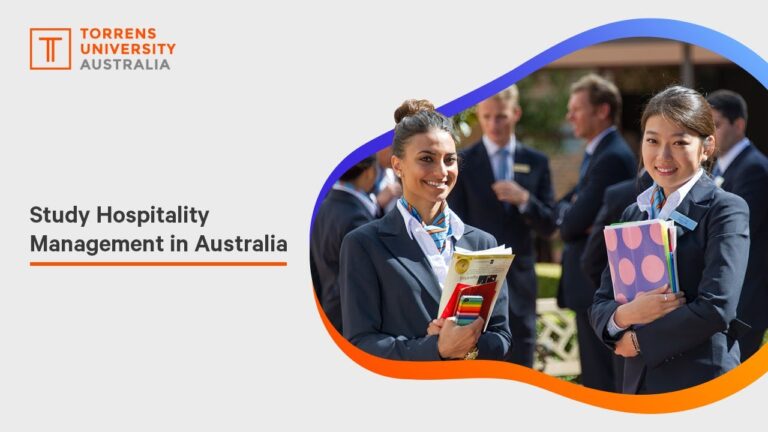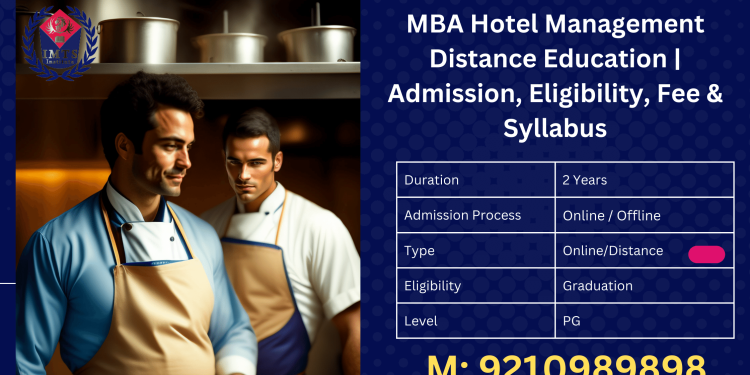MBA Online Hotel Management Specialization A Comprehensive Guide
MBA online hotel management specialization offers a dynamic pathway to success in the hospitality industry. This program blends core business acumen with specialized hospitality knowledge, equipping graduates with the skills to excel in a competitive market. Through a blend of online learning modules, interactive simulations, and networking opportunities, students gain a comprehensive understanding of hotel operations, revenue management, and strategic leadership, preparing them for diverse and rewarding careers.
This guide delves into the curriculum, career prospects, specialization options, technological integration, networking opportunities, and accreditation standards associated with online MBA programs in hotel management. We’ll explore the advantages of online learning compared to traditional on-campus programs, examining flexibility, cost-effectiveness, and the unique networking possibilities available in the digital sphere. The information provided aims to equip prospective students with a thorough understanding of this exciting and rapidly evolving field.
Program Overview
An online MBA with a specialization in hotel management offers a flexible and comprehensive education designed to equip professionals with the business acumen and hospitality expertise needed to succeed in the dynamic hospitality industry. This program blends core business principles with specialized knowledge in hotel operations, revenue management, and strategic hospitality planning, preparing graduates for leadership roles in various sectors of the industry.
Curriculum Details
The curriculum typically comprises a combination of core MBA courses and specialized hotel management modules. Core business courses might include accounting, finance, marketing, economics, operations management, and strategic management. These provide a strong foundation in general business principles. Specialized hospitality modules delve into areas such as hotel revenue management, hospitality marketing and sales, food and beverage management, hotel operations management, human resource management in hospitality, and sustainable hospitality practices.
Some programs may also offer electives allowing students to tailor their studies to specific interests, such as luxury hotel management or international hospitality. The specific courses offered can vary depending on the institution.
Admission Requirements
Admission requirements for online MBA programs in hotel management generally include a bachelor’s degree from an accredited institution, a minimum GPA (often 3.0 or higher), GMAT or GRE scores (requirements vary by program), and several years of relevant work experience (typically 2-5 years, often in the hospitality industry). A strong application essay showcasing the applicant’s career goals and motivation for pursuing the program is also crucial.
Some programs may also require letters of recommendation and a resume highlighting professional achievements and relevant skills.
Online vs. On-Campus Learning
The choice between an online and on-campus MBA in hotel management depends on individual learning preferences and circumstances. The following table compares key aspects of both learning modalities:
| Aspect | Online MBA | On-Campus MBA |
|---|---|---|
| Flexibility | High; study at your own pace and schedule. | Low; requires fixed class attendance. |
| Networking Opportunities | Moderately high; facilitated through online forums, group projects, and virtual events, but potentially less spontaneous than in-person interactions. | High; extensive opportunities for in-person networking with classmates, faculty, and industry professionals. |
| Cost | Generally lower than on-campus programs due to reduced overhead costs. | Generally higher due to tuition, accommodation, and living expenses. |
| Learning Environment | Self-directed learning requiring strong self-discipline. | Structured learning environment with direct interaction with faculty and peers. |
Career Prospects and Salary Expectations
An online MBA in hotel management opens doors to a wide array of lucrative and fulfilling career paths within the dynamic hospitality industry. Graduates equipped with this specialized degree benefit from enhanced managerial skills, strategic thinking capabilities, and a comprehensive understanding of the industry’s complexities, making them highly sought-after candidates. This advanced degree significantly improves career prospects and earning potential compared to those holding only a traditional hospitality degree.The combination of business acumen and hospitality expertise gained through an online MBA program provides graduates with a competitive edge in the job market.
This translates to not only higher starting salaries but also faster career progression and greater opportunities for leadership roles.
Potential Career Paths for Graduates
An online MBA in hotel management equips graduates with the skills and knowledge necessary for a variety of senior-level positions. These roles often involve strategic planning, financial management, and operational oversight.
- Hotel General Manager: Overseeing all aspects of hotel operations, including staff management, revenue generation, and guest satisfaction.
- Revenue Manager: Utilizing data analysis and forecasting to optimize pricing strategies and maximize hotel profitability.
- Director of Operations: Managing the day-to-day operations of a hotel or multiple hotel properties, ensuring efficiency and guest satisfaction.
- Food and Beverage Director: Overseeing all aspects of the hotel’s food and beverage services, including menu development, staff training, and cost control.
- Director of Sales and Marketing: Developing and implementing marketing strategies to attract guests and increase revenue.
- Area Manager/Regional Manager: Managing multiple hotels within a specific geographic area, overseeing operations and ensuring consistent brand standards.
Average Starting Salaries and Career Advancement
Graduates with an online MBA in hotel management can expect significantly higher starting salaries and greater opportunities for advancement than those with only a bachelor’s degree in hospitality. The specific salary will depend on factors such as location, experience, and the size and type of employer.
While precise figures vary based on location and employer, entry-level positions for MBA graduates in hotel management often command salaries exceeding those of individuals with only a bachelor’s degree in hospitality management. For example, a recent survey indicated that graduates with an MBA in hotel management secured starting salaries averaging 15-20% higher than their counterparts with only a bachelor’s degree in the same field.
Career advancement is also significantly accelerated. The strategic and analytical skills honed during the MBA program prepare graduates for more rapid promotion to senior management positions. For instance, an individual with an MBA might progress from an assistant manager role to a department head within two to three years, whereas a comparable individual without an MBA might take significantly longer.
Impact of an Online MBA on Salary Negotiations and Career Progression
The online MBA in hotel management provides a distinct advantage in salary negotiations and career progression. The advanced business skills and strategic thinking capabilities developed during the program translate directly into increased earning potential and faster career advancement.
Candidates with an online MBA are often viewed as more qualified and capable of handling complex management responsibilities. This perception allows them to negotiate higher salaries and secure more desirable positions. Moreover, the MBA demonstrates a commitment to professional development, further enhancing their marketability and desirability to employers.
In contrast to candidates with only a traditional hospitality degree, those with an online MBA possess a broader skill set, including financial analysis, strategic planning, and data-driven decision-making. This broader skillset allows for greater versatility and increased value to the organization. This translates into quicker promotions and higher earning potential throughout their career trajectory.
Specialization Options within Hotel Management

This online MBA specialization in Hotel Management offers diverse pathways to success, allowing students to focus their expertise on specific areas within the dynamic hospitality industry. Choosing a specialization allows for a deeper dive into a chosen field, enhancing career prospects and providing a competitive edge in the job market. The following sections detail three distinct specialization options, outlining their core focus, essential skills, and illustrative curriculum examples.
Revenue Management
Revenue management in the hotel industry focuses on optimizing pricing strategies and inventory control to maximize profitability. This involves analyzing market demand, competitor pricing, and historical data to make informed decisions about room rates, packages, and promotions. Professionals in this field are responsible for forecasting demand, managing room availability, and implementing dynamic pricing strategies.
Key skills for revenue management professionals include strong analytical abilities, proficiency in revenue management software, a deep understanding of market dynamics, and excellent communication skills to collaborate effectively with sales and marketing teams.
Real-world applications include setting optimal pricing for different room types based on seasonal demand, utilizing forecasting models to predict future occupancy, and implementing strategies to mitigate revenue loss during periods of low demand. For example, a revenue manager might utilize data analysis to identify the optimal price point for a weekend stay during a major city event, maximizing revenue while maintaining competitive pricing.
Hotel Operations Management
Hotel operations management encompasses the day-to-day running of a hotel, ensuring smooth and efficient operations across all departments. This includes overseeing housekeeping, front office, food and beverage services, and maintenance, ensuring guest satisfaction and operational efficiency. Professionals in this field are responsible for staff management, budget control, and implementing operational procedures to optimize performance.
Key skills for hotel operations managers include strong leadership and management skills, problem-solving abilities, attention to detail, and a deep understanding of hotel operations procedures. Proficiency in hotel management software is also crucial.
Real-world applications include managing staff schedules, overseeing maintenance and repairs, implementing cost-saving measures, and resolving guest complaints effectively. For instance, an operations manager might streamline the check-in process to reduce wait times, improving guest experience and staff efficiency. They might also implement a new inventory management system to reduce waste and improve cost control.
Luxury Hospitality Management
Luxury hospitality management focuses on providing exceptional service and experiences to high-end clientele. This specialization requires a deep understanding of luxury brands, personalized service, and the unique needs and expectations of discerning guests. Professionals in this area oversee all aspects of the guest experience, ensuring exceptional quality and attention to detail.
Key skills for luxury hospitality managers include impeccable communication and interpersonal skills, a strong understanding of luxury brand management, cultural sensitivity, and the ability to anticipate and exceed guest expectations. Expertise in creating bespoke experiences is essential.
Real-world applications include managing VIP guest services, coordinating bespoke experiences (e.g., private dining, curated tours), overseeing staff training on high-end service protocols, and maintaining the highest standards of quality and cleanliness. A luxury hotel manager might, for example, arrange a private chef’s dinner for a high-profile guest or curate a unique itinerary based on the guest’s interests.
Hypothetical Curriculum: Revenue Management Specialization
This specialization focuses on providing students with a comprehensive understanding of revenue management principles and their application in the hotel industry. The curriculum is designed to equip students with the skills and knowledge necessary to excel in revenue management roles.
| Course | Description |
|---|---|
| Revenue Management Fundamentals | Introduction to revenue management concepts, principles, and strategies. |
| Forecasting and Demand Analysis | Techniques for forecasting demand, analyzing market trends, and predicting future occupancy. |
| Pricing Strategies and Optimization | Development and implementation of effective pricing strategies to maximize revenue. |
| Revenue Management Systems and Technology | Hands-on training with revenue management software and technology. |
| Strategic Revenue Management | Advanced revenue management strategies, including segmentation and pricing optimization. |
| Capstone Project: Revenue Management Strategy for a Hypothetical Hotel | Students develop a comprehensive revenue management strategy for a hypothetical hotel, incorporating all concepts learned throughout the program. |
Technological Integration in Hotel Management Education

The online MBA in Hotel Management leverages technology to create a dynamic and engaging learning experience, mirroring the technologically advanced nature of the modern hospitality industry. This integration ensures students develop not only strong management skills but also a deep understanding of the technological tools and strategies essential for success in this competitive field. The program utilizes a variety of technological tools to enhance learning and prepare students for the realities of the modern hospitality landscape.Technology plays a multifaceted role in online MBA hotel management programs, extending beyond simple course delivery.
It fosters collaboration, simulates real-world scenarios, and provides access to a wealth of resources unavailable in traditional settings. This approach ensures graduates are equipped with the technological proficiency demanded by employers, making them highly competitive in the job market. Effective use of technology bridges the geographical gap inherent in online learning, creating a cohesive and interactive learning community.
Learning Management Systems (LMS), Virtual Simulations, and Online Collaboration Tools
The program utilizes a sophisticated Learning Management System (LMS) as the central hub for course materials, assignments, communication, and assessment. This platform typically provides features such as interactive lectures, downloadable resources, discussion forums, and automated grading systems. Students engage with virtual simulations of hotel operations, allowing them to practice management decisions in a risk-free environment, experiencing the consequences of their choices without real-world repercussions.
These simulations often cover areas such as revenue management, staffing optimization, and crisis management. Further enhancing the learning experience are online collaboration tools, facilitating teamwork on projects and fostering peer-to-peer learning. These tools might include shared document editors, video conferencing software, and project management platforms, enabling students to collaborate effectively despite geographical distances. For example, students might use a shared document to collaboratively develop a marketing plan for a simulated hotel, utilizing video conferencing to discuss their strategies and receive feedback from instructors and peers.
Innovative Teaching Methods in Online Hospitality Education
Online hospitality education employs various innovative teaching methods to maintain student engagement and ensure effective knowledge transfer. These include interactive case studies based on real-world hotel scenarios, allowing students to analyze challenges and propose solutions. Gamification techniques, such as points systems and leaderboards, can incentivize participation and promote friendly competition. Furthermore, the use of virtual reality (VR) and augmented reality (AR) technologies is emerging as a powerful tool for immersive learning experiences, enabling students to virtually tour hotels, design rooms, or even manage virtual hotel staff.
For instance, students might use VR to experience a virtual hotel check-in process, gaining a firsthand understanding of customer service interactions and operational workflows. The integration of microlearning modules allows students to learn at their own pace, focusing on specific concepts and skills. These short, focused learning units are easily digestible and conducive to busy schedules.
A Typical Online Learning Environment
Imagine a student logging into the LMS, accessing their course schedule and materials. They participate in a live online lecture via video conferencing, engaging with the instructor and classmates through the chat function. Later, they complete an interactive case study using a simulation program, analyzing a hotel’s financial performance and proposing solutions to improve profitability. Asynchronous activities such as reading assignments and forum discussions allow students to learn at their own pace and contribute meaningfully to the online community.
The instructor provides regular feedback on assignments and participates actively in online discussions, fostering a sense of community and support. Throughout the program, students utilize collaborative tools to work on group projects, using shared documents and video conferencing to coordinate their efforts. The instructor acts as a facilitator, providing guidance and support, ensuring the effective integration of technology to enhance learning and skill development.
Networking and Industry Connections

An online MBA in hotel management, while delivered remotely, doesn’t limit the crucial aspect of networking. In fact, innovative approaches and dedicated platforms actively foster connections within the hospitality industry, creating valuable relationships that extend far beyond the classroom. This section will explore how online programs facilitate networking and the significance of building strong professional relationships.Online MBA programs leverage technology to bridge geographical gaps and create vibrant networking communities.
These programs often incorporate virtual networking events, online forums, and collaborative projects that bring students together from diverse backgrounds and locations. This diverse exposure provides a rich learning environment and expands professional horizons beyond traditional geographical limitations. Furthermore, many programs actively cultivate relationships with industry professionals, providing opportunities for mentorship and guest lectures, enhancing the learning experience and providing valuable industry insights.
Online Platforms and Events for Networking
Online platforms are integral to facilitating networking in online MBA programs. Dedicated learning management systems (LMS) often include features that encourage interaction between students, such as discussion boards and collaborative workspaces. These platforms act as central hubs for communication and knowledge sharing, fostering a sense of community among students. Beyond the LMS, many programs organize virtual networking events, such as webinars and online conferences, featuring industry leaders and alumni.
These events provide opportunities for students to engage directly with professionals, ask questions, and build connections. Examples include virtual career fairs, where students can interact with recruiters from leading hotel chains and hospitality companies, and online workshops led by experienced professionals offering practical advice and career guidance. These platforms provide an accessible and efficient way for students to engage with the industry and expand their professional network.
Importance of Building Professional Relationships
Building professional relationships with industry leaders and alumni is paramount for success in the hospitality industry. Mentorship from experienced professionals provides invaluable guidance and insights into career paths, industry trends, and best practices. Alumni networks offer access to a vast pool of experienced professionals who can offer advice, support, and potential job opportunities. These relationships extend beyond immediate career benefits; they foster a sense of community and provide ongoing support throughout one’s career.
For instance, a student might connect with an alumnus working at a luxury hotel chain, leading to an informational interview or even an internship opportunity. Similarly, a mentorship with an industry leader could provide crucial guidance on navigating career challenges and achieving long-term career goals. These connections represent invaluable resources, extending the reach and impact of the online MBA experience.
Accreditation and Program Recognition
Choosing an online MBA program, especially one specializing in hotel management, requires careful consideration of its accreditation status. Accreditation signifies that the program meets specific quality standards and benchmarks set by recognized accrediting bodies. This assurance is crucial for potential employers, ensuring the program’s credibility and the value of the qualification obtained. It also often influences the program’s eligibility for financial aid and loan programs.Accreditation standards for online MBA programs in hotel management vary depending on the accrediting body.
Reputable accrediting agencies meticulously evaluate curriculum design, faculty qualifications, learning resources, student support services, and the overall effectiveness of the program in achieving its stated learning outcomes. A rigorous accreditation process ensures a high standard of education, increasing the likelihood of career success for graduates.
Accreditation Bodies and Program Features, MBA online hotel management specialization
The following table lists several accredited online MBA programs with hotel management specializations, their respective accrediting bodies, and notable program features. Note that program offerings and features can change, so it’s vital to verify the current information directly with the institution.
| Program Name | Accrediting Body | Notable Program Features | Example Specialization Focus |
|---|---|---|---|
| Example University 1 Online MBA (Hotel Management) | AACSB International | Focus on experiential learning, industry partnerships, and case studies. Strong emphasis on data analytics and revenue management. | Luxury Hotel Management |
| Example University 2 Online MBA (Hospitality Management) | AACSB International & ACBSP | Offers flexible learning formats, strong faculty with industry experience, and career services support. | Sustainable Hospitality Operations |
| Example University 3 Online Global MBA (Tourism & Hospitality) | AMBA | International focus, diverse student cohort, and opportunities for global networking. | International Hotel Development |
| Example University 4 Online MBA (with Hotel Management Concentration) | IACBE | Emphasis on practical application, strong online learning platform, and mentorship opportunities. | Hotel Operations & Revenue Management |
Summary
Pursuing an MBA online hotel management specialization presents a compelling opportunity to advance your career in the dynamic hospitality sector. By combining rigorous business education with specialized hospitality training, this program empowers individuals with the skills and knowledge to lead and innovate within the industry. The flexibility of online learning, coupled with robust networking opportunities and access to cutting-edge technology, positions graduates for success in a wide range of roles, from operations management to revenue strategy and beyond.
This guide has provided a foundational understanding; further research into specific programs and their accreditation is encouraged before making a decision.
FAQ Resource: MBA Online Hotel Management Specialization
What is the typical duration of an online MBA in hotel management?
The duration varies depending on the program, but typically ranges from 18 to 24 months.
Are there any prerequisites for admission beyond a bachelor’s degree?
Many programs require a minimum GPA, GMAT/GRE scores, and often some work experience in a related field. Specific requirements differ between institutions.
How does online learning facilitate networking in the hotel industry?
Many programs incorporate online forums, virtual events, and alumni networks to connect students with industry professionals and peers.
What are the potential career advancement opportunities after completing the program?
Graduates can pursue roles such as hotel manager, revenue manager, director of operations, or even entrepreneurial ventures in the hospitality sector. Career advancement depends on individual performance and experience.
What is the difference in cost between an online and on-campus MBA in hotel management?
Online programs generally have lower tuition fees and reduced living expenses compared to on-campus programs, though this can vary significantly between institutions.





